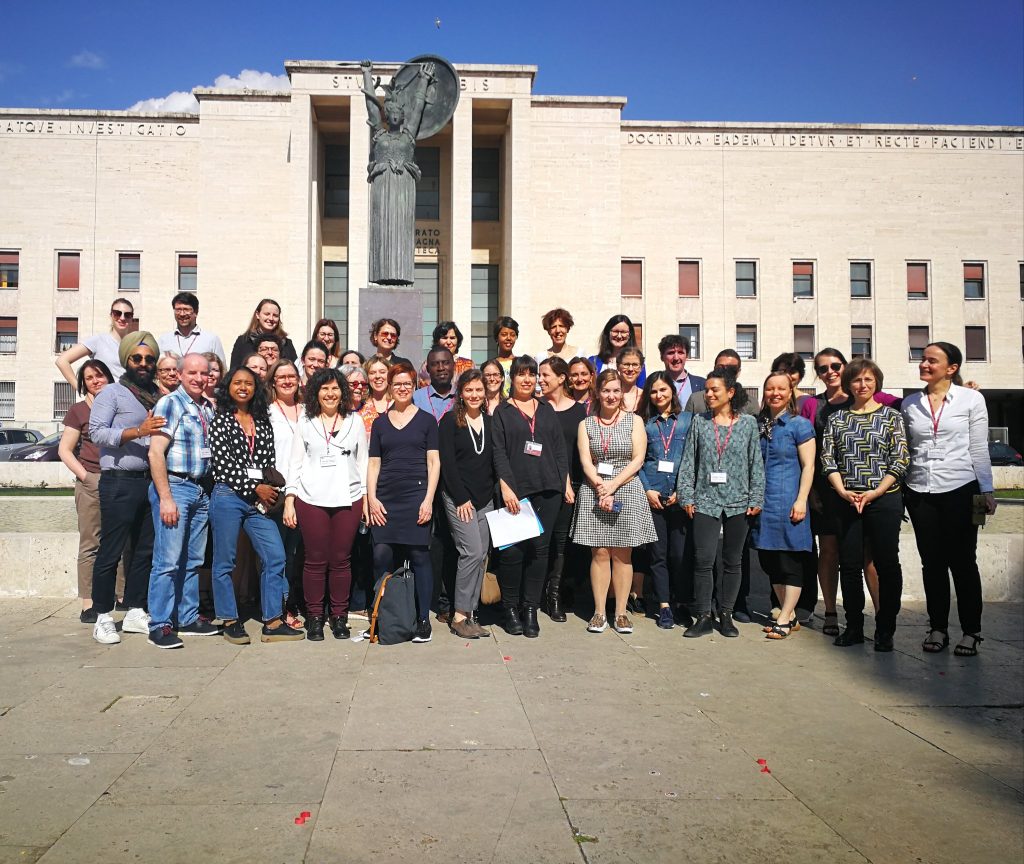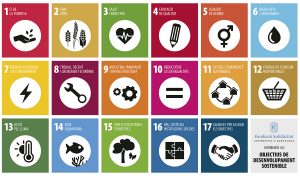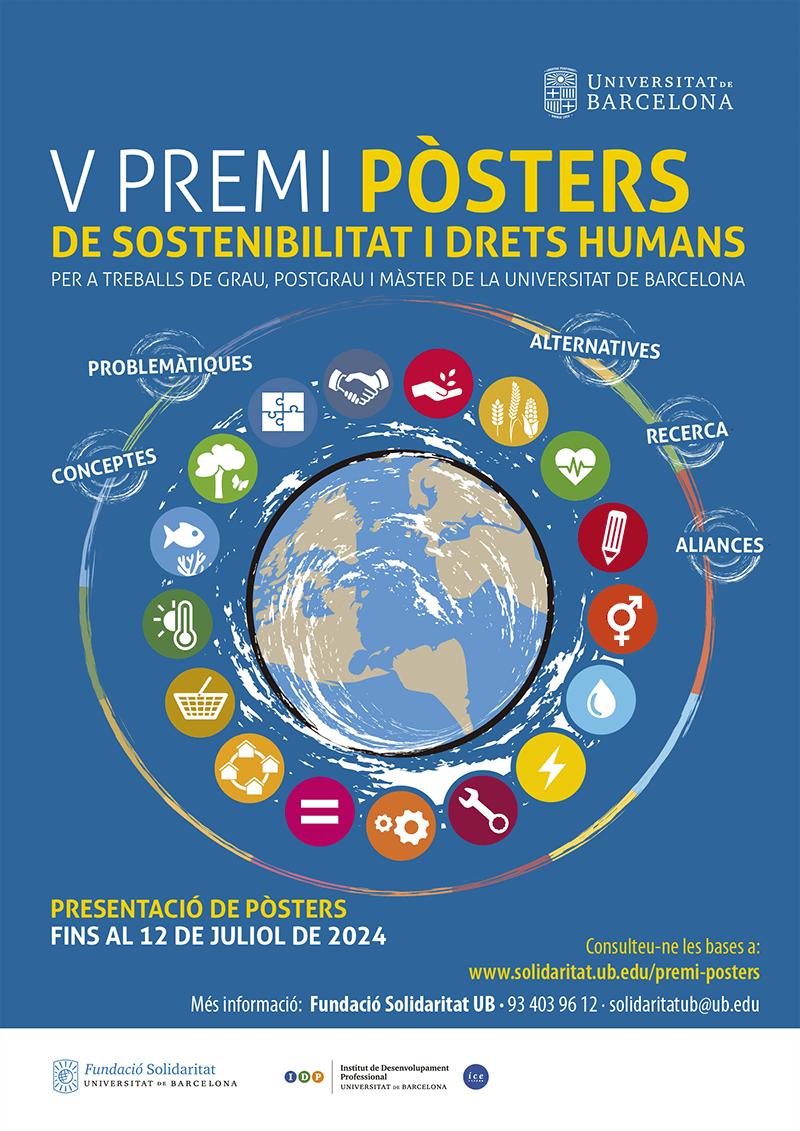[In English, below]
Una pàgina web recopila experiències i informació que institucions d’educació superior i entitats que treballen amb persones refugiades han intercanviat durant una formació del projecte a Roma.
 El projecte europeu inHERE (Higher Education Supporting Refugees in Europe), en què participa la Universitat de Barcelona, ha celebrat, del 16 al 20 d’abril de 2018, una setmana de formació en “Integració de les Persones Refugiades: el Rol de les Universitats” a La Sapienza Universitat de Roma.
El projecte europeu inHERE (Higher Education Supporting Refugees in Europe), en què participa la Universitat de Barcelona, ha celebrat, del 16 al 20 d’abril de 2018, una setmana de formació en “Integració de les Persones Refugiades: el Rol de les Universitats” a La Sapienza Universitat de Roma.
Durant la trobada, més de 50 institucions d’educació superior i organitzacions relacionades amb la integració de les persones refugiades a l’educació superior, de 19 països, han intercanviat experiències, testimonis i altres recursos en matèria d’accés a la universitat i integració socioeconòmica de les persones refugiades, que ara estan disponibles al web del projecte:
inHERE training resources
Entre aquests recursos es troben les experiències de la Universitat de Barcelona, que va presentar el seu “Programa de suport a les persones refugiades i procedents de zones en conflicte” i el “Protocol per a l’accés i l’admissió d’estudiants beneficiaris de protecció internacional als ensenyaments de grau, màster i títol propi de màster o postgrau“.
Amb l’objectiu de superar els reptes i millorar les pròpies activitats institucionals per a la inclusió de les persones refugiades, els i les participants a la formació han elaborat un missatge per als responsables polítics i el lideratge universitari a Europa, que servirà de base per a les properes activitats del projecte:
Una Europa inclusiva avui, una Europa potent demà
La migració, forçada i voluntària, és una característica contínua dels nostres temps, no un fenomen a curt termini. En aquest context, com a país i com a institució d’educació superior, és un privilegi ser inclusiu. La contribució potencial de les persones refugiades i migrants a les nostres societats pot ser un clar guany per a tots nosaltres.
Per aprofundir plenament en aquest potencial, els responsables polítics haurien de desenvolupar un marc d’integració holístic, amb una regulació que consideri el paper de l’educació, els drets humans i la dignitat humana. Els governs haurien d’encoratjar l’harmonització i l’optimització dels procediments per assegurar l’accés a l’educació en tots els nivells, començant per l’aprenentatge de les llengües locals com a qüestió d’integració. Les universitats estan compromeses amb l’acollida de les persones refugiades. Existeixen exemples de bones pràctiques arreu d’Europa, que requereixen inversions no a curt termini, sinó permanents i accessibles per garantir-ne la sostenibilitat.
Els sistemes d’educació superior han de ser oberts i no discriminatoris. La inclusió efectiva de les persones refugiades a l’educació superior es basa en una estratègia a llarg termini vinculada a la tercera missió de la universitat i la seva responsabilitat social. Aquest objectiu necessita estructures institucionalitzades i sostenibles amb les persones refugiades al centre, així com un compromís i implicació de tota la comunitat universitària.
Per tant, demanem a les societats europees que es comprometin a llarg termini a donar suport a la inclusió de les persones a través de l’educació.
Projecte inHERE
Cofinançat per la Unió Europea, a través del programa Erasmus+, el projecte inHERE busca crear oportunitats que facilitin l’accés i la integració de les persones refugiades a l’Espai Europeu d’Educació Superior.
Es tracta d’un projecte coordinat per la Unió d’Universitats de la Mediterrània (UNIMED), en què, a més de la Universitat de Barcelona, hi participen la European Universities Association (EUA), La Sapienza Universitat de Roma i el Campus France. L’Alt Comissionat de les Nacions Unides per als Refugiats (ACNUR) n’és membre associat.
The inHERE project collects resources for the access and integration of refugees to Higher Education
A web page puts together experiences and information that Higher Education Institutions and entities working with refugees have exchanged during the project’s training week, in Rome.
 The European project inHERE (Higher Education Supporting Refugees in Europe), in which the University of Barcelona takes part, has celebrated, from April 16 to April 20, 2018, a project staff training week on “Integration of Refugees: the Role of Universities” at La Sapienza University of Rome.
The European project inHERE (Higher Education Supporting Refugees in Europe), in which the University of Barcelona takes part, has celebrated, from April 16 to April 20, 2018, a project staff training week on “Integration of Refugees: the Role of Universities” at La Sapienza University of Rome.
During the meeting, more than 50 higher education institutions and organisations related to refugee integration into higher education, from 19 countries, have exchanged experiences, testimonies and other resources in terms of University access and socio-economic integration of refugees. All training materials and presentations are available on the project website:
inHERE training resources
Among these resources are the experiences of the University of Barcelona, which presented its “Support program for refugees and people from areas in conflict” and the “Protocol for access and admission of students beneficiaries of international protection to undergraduate degrees, master’s degrees and own master’s or postgraduate degrees“.
With a view to overcoming challenges and enhancing their own institutional activities for refugee inclusion, the training participants have developed a message to policy makers and university leadership in Europe, which will be the basis for upcoming project activities:
Inclusive Europe Today, Powerful Europe Tomorrow
Forced and voluntary migration are a continuous feature of our times, not short-term phenomena. Against this background, as a country as well as a higher education institution, it is a privilege to be inclusive. The potential contribution of refugees and migrants to our societies can be a clear gain for all of us.
In order to fully realise this potential, policy makers should develop a holistic integration framework, with regulation that considers the role of education, human rights, and human dignity. Governments should encourage the harmonisation and streamlining of procedures to ensure access to education on all levels, commencing with the learning of local languages as a matter of integration. Universities are committed to welcoming refugees. Good practice initiatives exist across Europe and they require not short-term, but permanent, accessible investment to support their sustainability.
Higher education systems have to be open and non-discriminatory. Effective inclusion of refugees into higher education relies on a long-term strategy linked to the university’s third mission and its social responsibility. This goal needs institutionalised and sustainable structures with refugees at the centre, as well as a commitment and involvement of the entire university community.
Therefore, we call upon European societies to commit in the long-term to support refugee inclusion through education.
inHERE project
Co-funded by the European Union, through Erasmus+ program, the inHERE project seeks to create opportunities that ease the access and integration to the European Higher Education Area for refugees.
This is a project coordinated by the Mediterranean Universities Union (UNIMED). Apart from the University of Barcelona, other members of the inHERE are the European Universities Association (EUA), La Sapienza University of Rome and Campus France. The United Nations High Commissioner for Refugees (UNHCR) is an associate member.
Aquesta notícia té relació amb els següents ODS de l’Agenda 2030:











